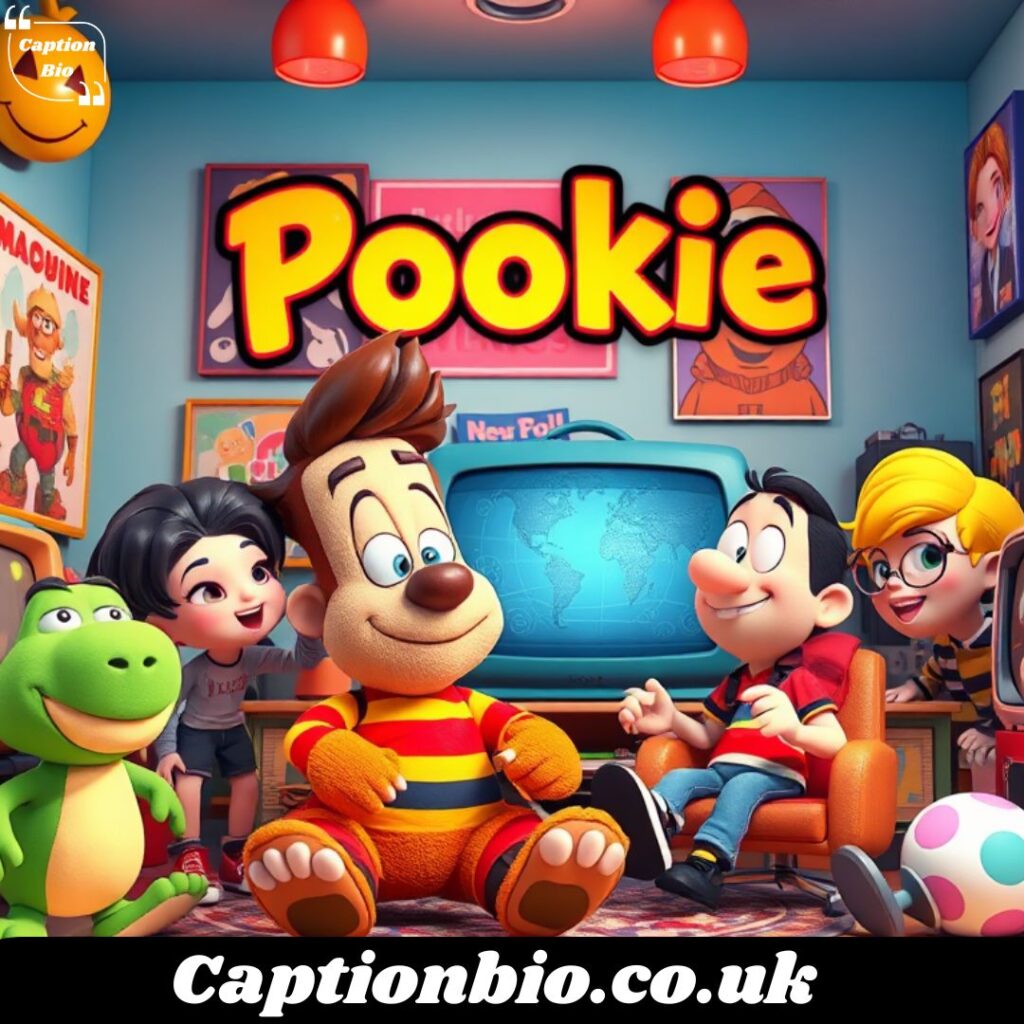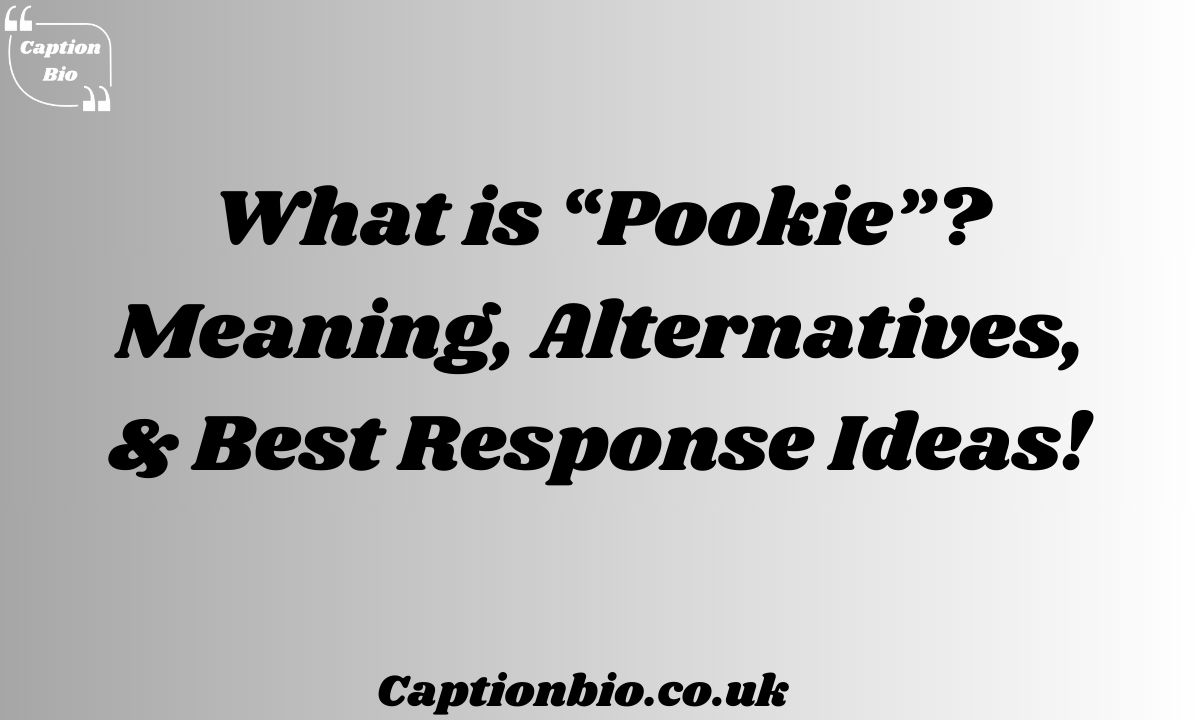“Pookie” is a cute, affectionate nickname people use for someone they love. It’s a term of endearment that shows closeness and intimacy in a relationship. Many people use nicknames like “babe,” “honey,” or “sweetheart” as alternatives to “pookie.”
When someone calls you “pookie,” you could respond with your own nickname for them, say “I love when you call me that,” or simply smile and embrace the special bond it represents.
aQuick Facts on Pookie
Pookie is a sweet nickname used between people who share a close bond. It gained popularity in American culture through movies, music, and social media. The nickname has no official definition but carries connotations of affection and playfulness.
Many couples and friends use this pet name alongside others like “honey” or “sweetie.” Pookie can be used for romantic partners, children, friends, or even pets.
What Does Pookie Mean?

Pookie is an affectionate term of endearment typically used to express love, fondness, or closeness between people. When someone calls you pookie, they’re showing their affection in a cute, familiar way. The term creates an intimate connection between people and often indicates a special relationship.
While it has no literal definition, pookie conveys warmth, tenderness, and a unique bond. The nickname feels personal and special, making it a popular choice for those wanting to express their affection in a playful, endearing manner.
1. Romantic Affection
Couples often use “pookie” as a sweet nickname to express love. It creates intimacy between partners during special moments or daily interactions. Many find it adds playfulness to their relationship while maintaining a sense of closeness.
The term can become a couple’s private language, strengthening their unique bond. Partners might use it during tender moments or to lighten the mood during disagreements.
Using pet names like “pookie” in romantic relationships has been linked to higher satisfaction levels. It signals comfort and security between partners, helping them feel cherished.
2. Friendly Teasing
Friends sometimes adopt “pookie” as a playful nickname within their social circles. It can signal closeness without romantic implications, creating group identity and inside jokes.
The nickname often emerges from shared experiences or memorable moments. Friends might use it to show affection while maintaining the casual nature of their relationship.
In friend groups, “pookie” can become part of lighthearted banter. It’s typically used with close friends rather than acquaintances, signaling a comfortable level of familiarity.
3. Familial Warmth
Parents commonly call their children “pookie” as an expression of love and protection. The nickname carries nurturing energy when used within family relationships.
Siblings and extended family members might adopt the term for younger relatives. It creates a sense of belonging and special connection within the family unit.
The nickname often sticks from childhood into adulthood, becoming a reminder of family bonds. Many adults smile when a parent or grandparent still uses their childhood nickname.
4. Affectionate for Pets
Pet owners frequently use “pookie” when talking to their beloved animals. It’s especially common for small dogs, cats, and other cuddly companions.
The nickname fits naturally with the baby-talk register many people use with their pets. Animal lovers might combine it with other terms like “pookie bear” or “pookie pie.”
Using affectionate nicknames for pets strengthens the human-animal bond. Many pet owners develop several pet names that they use interchangeably with their furry friends.
5. Pop Culture Influence
The term “pookie” has appeared in numerous songs, movies, and TV shows. Notable examples include Garfield’s teddy bear and characters in films like “New Jack City.”
Social media has expanded the nickname’s usage across different communities. Influencers and celebrities sometimes use it publicly with their partners or followers.
The term’s popularity has evolved through different eras of pop culture. While some view it as timeless, others see it as having distinct periods of popularity influenced by media trends.
Alternative Nicknames Similar to “Pookie”
If you’re looking for options beyond “pookie,” consider sweet alternatives like “honey,” “sweetie,” or “babe” for everyday use. More unique choices include “muffin,” “cupcake,” or “pudding” for food-inspired nicknames.
Animal-themed options like “bunny,” “kitten,” or “bear” work well too. Some prefer personalized variations such as adding “-kins” or “-pie” to their partner’s name. Each nickname creates its own special feeling while maintaining that affectionate connection.
1. Snookums
“Snookums” is a playful, slightly old-fashioned term of endearment that sounds cute and cuddly. It shares the same sweet, affectionate tone as “pookie” but with a more whimsical sound.
Many couples use this nickname during particularly sweet moments or when being deliberately cute with each other. The term has a nostalgic quality that reminds some of classic romantic comedies.
Despite sounding somewhat childish, “snookums” continues to be popular among partners who enjoy playful, lighthearted expressions of affection. It often evokes smiles and can help lighten the mood during tense moments.
2. Sweetie
“Sweetie” is one of the most universally used terms of endearment across all relationship types. It directly references the sweet nature of the person being addressed with simple, straightforward affection.
The nickname works well in both casual and intimate settings, making it versatile for public and private use. Many find it less embarrassing than other pet names when overheard by others.
“Sweetie” can be used between romantic partners, family members, close friends, and even sometimes for children or pets. Its widespread use makes it comfortable and familiar for most people.
3. Honeybun
“Honeybun” combines the classic endearment “honey” with a cute food reference, creating a warm, affectionate nickname. It suggests the person is both sweet and a comfort, like a warm pastry.
The term has a cozy, homey quality that many associate with comfort and care. Partners often use it during moments of offering support or expressing appreciation.
“Honeybun” works particularly well as a morning nickname or greeting, perhaps due to its breakfast pastry association. It carries a nurturing energy that many find comforting.
4. Cutie Pie
“Cutie pie” directly acknowledges someone’s adorable qualities while adding a sweet food reference. It’s playful, light, and often used when someone does something particularly endearing.
This nickname tends to emphasize physical attractiveness combined with charming personality traits. It’s frequently used during moments of appreciation or sudden affection.
The term remains popular across generations, appearing in everything from vintage love letters to modern text messages. Many people use it specifically when their partner or friend is being especially adorable.
5. Lovebug
“Lovebug” creates an image of someone small, cute, and lovable like a friendly insect. The term combines direct mention of love with a diminutive that suggests the person brings joy.
The nickname often fits relationships with a playful dynamic and plenty of laughter. Some couples create variations like “buggy” or “love bug” with different emphases.
“Lovebug” can imply someone is affectionate and likes to stay close, similar to how insects might land on you. It’s particularly common in Southern American regional speech patterns.
6. Buttercup
“Buttercup” refers to a bright yellow wildflower, suggesting the person brings sunshine and beauty into someone’s life. The nickname has a cheerful, uplifting quality.
The term gained popularity from the Princess Bride character, where it was used ironically but became genuinely affectionate. Many couples incorporate movie references into their use of this nickname.
“Buttercup” works well for people with sunny, positive dispositions who brighten their loved ones’ days. It often evokes images of summer meadows and happiness.
7. Darling
“Darling” has a classic, sophisticated quality that sets it apart from cuter pet names. It suggests deep affection with a touch of maturity and elegance that many appreciate.
The term crosses cultural boundaries, appearing in British, American, and various other English-speaking traditions. It carries slightly different connotations depending on accent and context.
“Darling” works equally well in serious and lighthearted moments, making it versatile for long-term relationships. Many associate it with golden-age Hollywood romance and timeless love stories.
How to Respond When Called “Pookie”
When someone calls you “pookie,” you have several good response options. You might simply smile and respond with your own nickname for them, creating a sweet exchange. Some people appreciate the affection and say “I love when you call me that” to encourage the pet name.
Others playfully lean into it with “Yes, pookie?” or a similar response. If you’re uncomfortable, gently suggest an alternative nickname you prefer instead. Most importantly, respond in a way that feels natural for your relationship.
1. Keep It Playful
When someone calls you “pookie,” maintaining a lighthearted response keeps the mood fun. A simple wink or playful smile acknowledges their affection without making things awkward.
Try responding with a silly voice or adding your own twist to the nickname. Something like “Yes, my little muffin?” creates a shared moment of playfulness between you.
Humor helps strengthen bonds when exchanging pet names. Don’t overthink your response—natural reactions often work best when someone uses an affectionate nickname like “pookie.”
2. Show Affection
Responding with genuine warmth when called “pookie” reinforces the connection between you and the speaker. A gentle touch on their arm or a warm hug shows appreciation for their affection.
Use the moment to express how much you value your relationship. Saying something like “I love when you call me that” validates their choice of nickname and deepens your bond.
Physical responses like leaning closer or making eye contact can speak volumes. These non-verbal cues communicate that you welcome this level of intimacy in your relationship.
3. Play Along with a Little Surprise
Unexpected responses to being called “pookie” can add excitement to your relationship. Try surprising them with a creative comeback like “At your service, my captain” or something similarly unexpected.
Creating your own special reaction to the nickname builds a unique ritual between you. Over time, these small traditions become meaningful parts of your shared history.
Consider occasionally responding with a small gesture or inside joke that only the two of you understand. These moments of connection make ordinary interactions feel special and deliberately chosen.
4. Embrace It and Own It
Fully accepting the nickname “pookie” shows confidence and comfort in your relationship. Respond by proudly introducing yourself to others as “the famous Pookie” when your partner uses the nickname around friends.
Making the nickname part of your identity can strengthen your bond. Create accounts or signatures that incorporate it, showing you value this special name they’ve given you.
People who embrace their pet names often find their relationships include more moments of joy and connection. When you own your nickname, you transform it from just a word into a symbol of your unique relationship.
5. Respond With a Compliment
Turn the nickname moment into an opportunity to build up your partner. When they call you “pookie,” respond with something like “Yes, gorgeous?” or another affirming term.
Complimenting the nickname-giver creates a positive feedback loop of affection. This approach encourages more sweet exchanges while making both people feel valued and appreciated.
Focus your compliment on something specific you love about them in that moment. This shows thoughtfulness beyond just responding to their nickname and deepens your connection.
6. When to Set Boundaries
If “pookie” makes you uncomfortable, it’s perfectly okay to gently redirect. A simple “I’d prefer you call me [alternative]” communicates your boundary without rejecting their affection.
Consider the context before setting limits—some situations might warrant different boundaries. You might be fine with “pookie” in private but prefer your name in professional or public settings.
Honest conversations about nicknames strengthen relationships by ensuring both people feel respected. Most partners appreciate knowing your true preferences rather than pretending to like a nickname that doesn’t fit.
Famous Uses of “Pookie” in Pop Culture

The nickname “pookie” has appeared throughout entertainment history in memorable ways. Garfield the cat famously had a teddy bear named Pookie, showing the term’s sweet, comforting nature. In the film “New Jack City,” the character Pookie became a cultural reference point.
The 1969 film “Goodbye, Columbus” featured Ali MacGraw’s character using “pookie” as an endearment. Several songs across various genres mention the nickname, including tracks by Janet Jackson and Usher. These references have helped cement “pookie” in our collective understanding of affectionate terms.
1. “The Pookie Syndrome” in The Cosby Show
The Cosby Show featured a memorable episode about “The Pookie Syndrome,” where Rudy’s friend Kenny struggled with his grandmother’s embarrassing nickname for him. This storyline resonated with viewers who experienced similar nickname situations.
The episode explored how childhood nicknames can follow us into different stages of life. Kenny wanted to appear more grown-up, making “Pookie” feel infantilizing in front of his peers.
This popular sitcom moment helped normalize conversations about outgrowing certain terms of endearment. Many viewers related to the challenge of balancing family traditions with developing independence and identity.
2. “Pookie” in New Jack City
In the 1991 film “New Jack City,” actor Chris Rock portrayed a character nicknamed “Pookie,” a crack addict who later becomes an informant. This dramatic role gave the nickname a gritty, urban association different from its sweeter usage.
Rock’s powerful performance made “Pookie” a memorable character in African American cinema. The nickname became shorthand for discussing addiction and redemption themes in pop culture conversations.
Despite the character’s struggles, many viewers felt sympathy for Pookie, creating a complex legacy for this version of the nickname. The film’s cultural impact ensured this interpretation of “pookie” remained in public consciousness for decades.
3. “Pookie” in Music
Janet Jackson used “pookie” in her 1997 hit “Together Again,” giving the nickname widespread exposure in popular music. The affectionate usage in this upbeat song reinforced the term’s positive associations.
Hip-hop artists have frequently referenced “pookie” in lyrics, sometimes as a character name or term of endearment. This helped spread the nickname across different musical genres and communities.
Songs like Usher’s “My Boo” contain lyrics mentioning “pookie,” connecting the term to romantic relationships. These musical references helped cement the nickname in American slang vocabulary across generations.
4. “Pookie” in Internet Memes
The term “pookie” gained renewed popularity through social media platforms like TikTok and Twitter. Users often create memes addressing their romantic partners as “pookie” in exaggerated, humorous scenarios.
Internet culture expanded the nickname beyond just romantic contexts. “Pookie” now appears in friendship memes, pet content, and even self-referential jokes where people call themselves “pookie.”
The hashtag #pookie has millions of views across platforms, showing how digital culture revitalized this classic nickname. Many young users have embraced the term ironically before genuinely adopting it in their relationships.
5. “Pookie” in Cartoons and Children’s Shows
Garfield the cat’s beloved teddy bear named “Pookie” introduced many children to this nickname. The orange cartoon cat’s attachment to his stuffed toy showed even grumpy characters need comfort objects.
Children’s television shows occasionally feature characters nicknamed “Pookie,” typically portrayed as cute, lovable figures. These appearances help reinforce the term’s association with innocence and affection.
Animated characters with this nickname tend to be small, sweet, and endearing, establishing “pookie” as a term for someone special and cherished. This media representation influences how children understand and later use the nickname themselves.
Frequently Asked Questions
Is “pookie” only used for romantic partners?
No, “pookie” can be used for romantic partners, family members, close friends, and even pets.
Where did the nickname “pookie” originate?
The exact origin is unclear, but “pookie” has been used as an affectionate nickname since at least the 1950s.
Is “pookie” considered childish?
While some view it as playful or cute, many adults use “pookie” in mature relationships without any childish connotation.
Can “pookie” be used sarcastically?
Yes, like many terms of endearment, “pookie” can be used playfully or sarcastically depending on tone and context.
Should I call someone “pookie” if I just started dating?
Pet names usually develop naturally as relationships grow closer, so it might be best to wait until your relationship feels established.
Conclusion
Nicknames like “pookie” add warmth and personality to our relationships, creating special bonds through language. Whether used between romantic partners, friends, family members, or for beloved pets, these terms of endearment help express affection in ways that feel both personal and meaningful.
The nickname has stood the test of time because it captures a certain sweetness that transcends generations.The best response to being called “pookie” depends entirely on your relationship with the person and your personal comfort level.

Jane Doe, founder of CaptionBio.co.uk, crafts heartfelt messages to inspire love, gratitude, and daily positivity. Let’s spread kindness through words!






